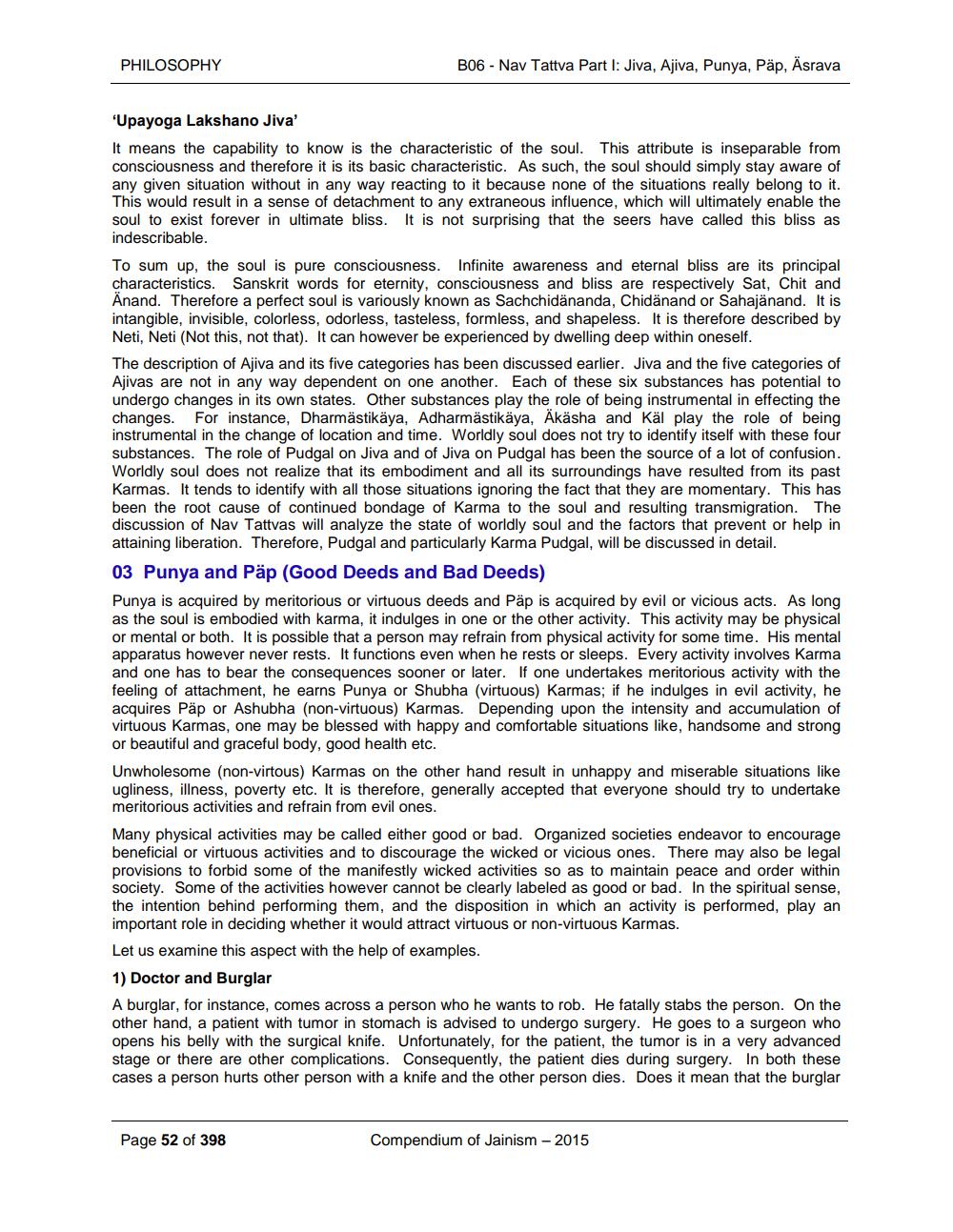________________
PHILOSOPHY
B06Nav Tattva Part I: Jiva, Ajiva, Punya, Päp, Äsrava
'Upayoga Lakshano Jiva'
It means the capability to know is the characteristic of the soul. This attribute is inseparable from consciousness and therefore it is its basic characteristic. As such, the soul should simply stay aware of any given situation without in any way reacting to it because none of the situations really belong to it. This would result in a sense of detachment to any extraneous influence, which will ultimately enable the soul to exist forever in ultimate bliss. It is not surprising that the seers have called this bliss as indescribable.
To sum up, the soul is pure consciousness. Infinite awareness and eternal bliss are its principal characteristics. Sanskrit words for eternity, consciousness and bliss are respectively Sat, Chit and Änand. Therefore a perfect soul is variously known as Sachchidananda, Chidänand or Sahajänand. It is intangible, invisible, colorless, odorless, tasteless, formless, and shapeless. It is therefore described by Neti, Neti (Not this, not that). It can however be experienced by dwelling deep within oneself.
The description of Ajiva and its five categories has been discussed earlier. Jiva and the five categories of Ajivas are not in any way dependent on one another. Each of these six substances has potential to undergo changes in its own states. Other substances play the role of being instrumental in effecting the changes. For instance, Dharmästikäya, Adharmästikäya, Äkäsha and Käl play the role of being instrumental in the change of location and time. Worldly soul does not try to identify itself with these four substances. The role of Pudgal on Jiva and of Jiva on Pudgal has been the source of a lot of confusion. Worldly soul does not realize that its embodiment and all its surroundings have resulted from its past Karmas. It tends to identify with all those situations ignoring the fact that they are momentary. This has been the root cause of continued bondage of Karma to the soul and resulting transmigration. The discussion of Nav Tattvas will analyze the state of worldly soul and the factors that prevent or help in attaining liberation. Therefore, Pudgal and particularly Karma Pudgal, will be discussed in detail.
03 Punya and Päp (Good Deeds and Bad Deeds)
Punya is acquired by meritorious or virtuous deeds and Päp is acquired by evil or vicious acts. As long as the soul is embodied with karma, it indulges in one or the other activity. This activity may be physical or mental or both. It is possible that a person may refrain from physical activity for some time. His mental apparatus however never rests. It functions even when he rests or sleeps. Every activity involves Karma and one has to bear the consequences sooner or later. If one undertakes meritorious activity with the feeling of attachment, he earns Punya or Shubha (virtuous) Karmas; if he indulges in evil activity, he acquires Päp or Ashubha (non-virtuous) Karmas. Depending upon the intensity and accumulation of virtuous Karmas, one may be blessed with happy and comfortable situations like, handsome and strong or beautiful and graceful body, good health etc.
Unwholesome (non-virtous) Karmas on the other hand result in unhappy and miserable situations like ugliness, illness, poverty etc. It is therefore, generally accepted that everyone should try to undertake meritorious activities and refrain from evil ones.
Many physical activities may be called either good or bad. Organized societies endeavor to encourage beneficial or virtuous activities and to discourage the wicked or vicious ones. There may also be legal provisions to forbid some of the manifestly wicked activities so as to maintain peace and order within society. Some of the activities however cannot be clearly labeled as good or bad. In the spiritual sense, the intention behind performing them, and the disposition in which an activity is performed, play an important role in deciding whether it would attract virtuous or non-virtuous Karmas.
Let us examine this aspect with the help of examples.
1) Doctor and Burglar
A burglar, for instance, comes across a person who he wants to rob. He fatally stabs the person. On the other hand, a patient with tumor in stomach is advised to undergo surgery. He goes to a surgeon who opens his belly with the surgical knife. Unfortunately, for the patient, the tumor is in a very advanced stage or there are other complications. Consequently, the patient dies during surgery. In both these cases a person hurts other person with a knife and the other person dies. Does it mean that the burglar
Page 52 of 398
Compendium of Jainism - 2015




